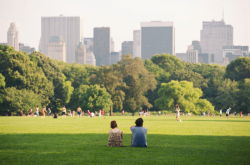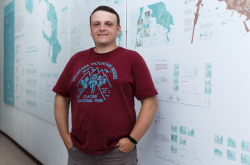Comfortable urban area appropriate for the purposes of citizens, industry and business, increasing of transport flows, ecological, social and economic problems — all of these issues are always widely discussed by urban experts. However they become much more relevant as the anniversary of Sustainable Development approaches. The initiative was offered by the United Nations in 1987. Furthermore 2017 was announced as Russia’s Ecological Year.
The specialists met at a roundtable meeting «Metropolis as a platform of technological development: urban environment’s evolution.» Irina Shmeleva, associate professor at ITMO’s Institute of Design and Urban Studies and participant of the discussion supposes that one has to keep balance when developing an urban area. It means that all present needs are met but at the same time the interests of the following generations are taken into account. To follow this concept the European countries participate in the European Green Capital Award. During the last years 10 cities took the first prize — unfortunately, none of them were Russian. The experts came to the understanding that sustainable development is not popular in Russia — its' rules are more on paper than in reality.

«This idea is proved by tons of cases of destroying St. Petersburg’s environment, constant conflicts between developers and citizens who cannot reach an agreement on the issue of housing development in parks and gardens as well as avenues and tram tracks' abolishment. For example, there is almost no tram service downtown, even though it is one of the most eco-friendly transport services…»
However St. Petersburg also has positive trends such as bicycle rent points and bikeways. These and others ideas and projects are described in «St. Petersburg development program 2030.» According to the experts, all of them can be implemented only through joint efforts.
As far as transport problems are concerned, the participants of the discussion noted the increase of both public and private transport users. There are several things that determine the choice of transport. There are minimizing of move time, comfort, cost efficiency and public image.

«Today we face the process of digitalization of transport-citizen interaction and applying of mobile data to transport planning. Mobile apps for routing, choosing of transport and transfer optimization,» noted Timofei Volotskiy, transport engineer and head of «Optimal Transport Systems» lab at the Institute of Design and Urban Studies.
These trends make citizens' livesmore comfortable and also beneficial for business institutions dealing with transport. There are several trends in increasing of transport system’s efficiency such as satellite monitoring of transport, online transport payment systems, transport modeling, multiagent modeling, and self-driving cars.
«It is obvious that the city has its' problems. But apart from discussing them we also have to attract citizens for solving them,» summed up Sergei Mityagin, the head of ITMO’s Institute of Design and Urban Studies.



